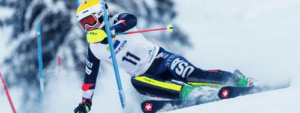“Our Equality would bring tremendous value to the entire Olympic family”

[ad_1]
Germany’s new women’s head coach Florian Aichinger joined this weeks Tuesday Talk to chat about his first weeks in the new position and which challenges he will face together with his team.
The 39-year-old former Nordic Combined athlete and Austrian National Champion 2002 follows Klaus Edelmann, who is retiring as German head coach. Aichinger will be supported by Matthias Olvermann, who is a newcomer to the coaching team as a former Nordic Combined athlete and trained sports scientist.
Before taking over them Women’s National Team, Aichinger was responsible for the German Youth teams (B/C squad) and accompanied, among others, Olympic champion Vinzenz Geiger on his way to the Men’s National Team. For the past two years, he has been the head coach of the German men’s Perspective team in the Continental Cup.
As coach of the women’s national team, numerous tasks await you. What have the first few weeks been like in this new position?
In the first few weeks, the most important thing for me is to get in touch with the athletes, regional and home trainers. Things that happen in the daily process have to be coordinated as well.
Personal contact is the most important thing at the beginning and we have achieved that now, after speaking to all coaches and women. There are also organizational tasks, such as training courses and equipment questions, which we comleted within the first weeks. It was stressful, but we made a lot of progress.
As a former athlete, you know the challenges of Nordic Combined very well. What are the current strengths and weaknesses of your team?
My women have their strengths and weaknesses in both disciplines. Of course, the main focus is to promote the strengths and eliminate those weaknesses.
As with all Combined athletes, you should try to lay the foundations in Ski Jumping and make progress, which is possible due to great facilities, training opportunities and a good training course system.
In the skiing part we are already close to the top and will try to expand further to get to the front step by step.
Basically, I see only a few weaknesses and think that a lot is possible and we can attack fully soon.
The first competitions will take place as part of the Summer Grand Prix. How important are these events to get an impression of the level of performance of your athletes?
For us, the Summer Grand Prix is a determination of where we stand, but it shouldn’t be more. We have a lot of things that we still have to catch up on, so it may be necessary to take a step back in order to move forward overall. We’ll see where we’re at right now, what the other athletes are doing and where the journey could go for us, so we don’t set any big goals. Therefore, we will first try to access only the performance from the training constantly during those summer competitions.
With Svenja Würth you have a Ski Jumping World Champion in your team, Jenny Nowak has the Junior World Championship title in her pocket: How do you deal with the great expectations that the head coach position brings with it?
Very difficult question, but I don’t feel any great expectations towards myself. I think we have to prioritize the process of building a division that is sustainable for years to come. With young athletes, the goal is to always bring the creative process forward, which is the focus here. Forming a team with the home and youth coaches and creating a kind of family is my top priority. Only secondarily do we strive for concrete achievements, because of course we want to get closer to the best in the world bit by bit, but at the moment we have to clear up individual “construction sites” first.
The FIS Nordic World Ski Championship premiere of the Mixed Team event awaits all fans in Planica (SLO) this winter: What advantages do you see in this competition format?
The Mixed Team is a huge opportunity for us to get the media spotlight and to be able to compete together with the most well-known faces of the Nordic Combined, such as Eric Frenzel and Johannes Rydzek.
In addition, the format offers an opportunity for smaller nations, who find it easier to do the sprint distance and can present themselves well with two women and two men if there are otherwise difficulties in getting four people together, as in the classic Team event. That’s why I find the Mixed Team extremely exciting, also because of the quick changes and different genders. It’s simply a great competition format.
The future of the entire discipline stands and falls with the decision of the IOC on the participation of women in the Olympics this summer. What would you like to convey to those responsible in the decision-making process?
My heart is in Nordic Combined! It is one of the oldest and most traditional sports that exist at the Olympic Winter Games and, in my opinion, it is more than overdue that there should finally be equality here. We are doing everything to ensure that it finally happens, the National Associations are fully behind it with a lot of their own effort and give everything to advance Nordic Combined in general, but especially the women.
We are all hoping for a positive outcome of the decision, because otherwise it will be very bitter for all of us.
I would like to convey to the IOC that equality would bring tremendous value to the entire Olympic family, not just Nordic Combined itself.
[ad_2]
Source link





